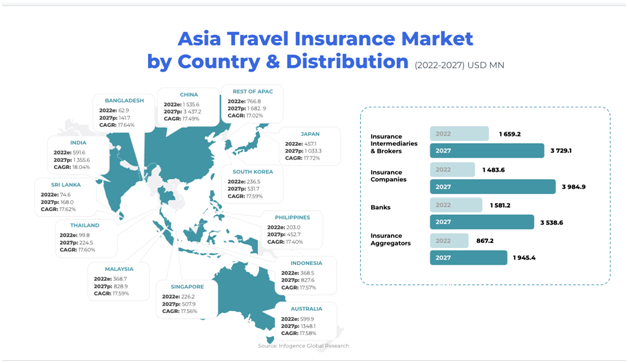
Asia Pacific is expected to be a major growth driver for the global travel and tourism industry, as the region market is estimated to be around US$7.2 billion as of 2017, with potential for further growth up to 2023. With the increasing popularity of travel as well as the rise of digital platforms and services, the travel insurance industry is becoming increasingly competitive, with new players entering the marketplace on a regular basis. With many options available today, it can be difficult for consumers to find the most suitable coverage for their needs. However, there is great potential in this sector for those willing to explore new possibilities.
There has been a lot of positive growth in the travel insurance industry in recent years, as this is due to increased consumer demand for reliable, quality cover against the incidents that can occur while traveling. As more people become aware of the risks that come with travelling, they are also looking for innovative solutions and products such as the personalization of policies for individual needs. There is a growing need for companies to be able to provide these services and remain competitive in the market.
Current trends show that there is a steady rise in the demand for travel insurance coverage and providers have responded accordingly, offering more convenient and cost-effective solutions to customers.

Source: Infogence Global Research, 2022
On average, the Asia-Pacific region sees an average of about 17% of growth within the next 5 years, with the top contenders being Japan, Bangladesh, and India. Among the industry stakeholders, it is evident that insurance companies would see the greatest growth relative to others in the years to come.
The travel insurance marketplace is an expanding industry, with consumers spending billions of dollars for coverage each year. The potential for growth in this sector is strong, as more people plan trips abroad and seek to protect themselves from unexpected costs.
Market analysts have estimated that the global market size for travel insurance will reach $50 billion by 2025, due to rising demand driven by changes in lifestyles and attitudes towards risk. This increase in spending indicates that the travel insurance marketplace is an attractive investment opportunity for companies looking to capitalize on this growing demand.
The travel insurance sector has recently been disrupted by new players aiming to provide more comprehensive and cost-effective products. These new disruptors are leveraging technology to make insurance policies more affordable and comprehensive. For example, these disruptors offer services such as instant online quotes and short-term policies, allowing customers to easily compare options to find the policy that is right for them. Additionally, many of them offer customized plans that can be tailored to individual needs, providing extra protection when needed. As a result, travelers looking for an affordable and reliable way of protecting themselves while on the move have access to a much wider range of products than ever before.
The modern business landscape is growing increasingly complex and competitive, so companies are now exploring opportunities in product development and partnering with other companies. Product development can help businesses create new goods and services that are tailored to their customer’s needs, while partnerships can provide new skills, resources, and insights for both parties.
Through these collaborations, businesses can access a larger market share, gain more customers; thereby, driving new revenue streams and opening up global opportunities. It’s an effective way for companies to stay ahead of their competitors as well as develop innovative solutions that address customer problems.
The rise of digitalisation, automation and artificial intelligence (AI) is revolutionising the way products are being designed and delivered, giving customers more choices than ever before. Furthermore, traditional insurers are facing increased competition in the market with the entrance of InsurTech startups. Finally, changes to international regulations regarding travel insurance have further opened up the sector for new players and new strategies. All of these developments mean that consumers now have access to more flexible, affordable and tailored travel insurance policies than ever before.